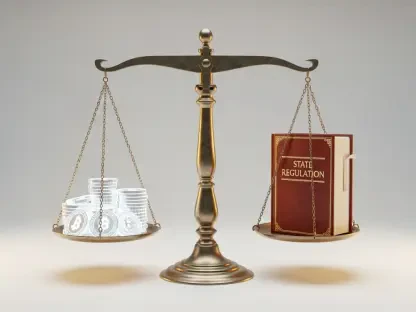In recent years, technology has promised to redefine various sectors, and Kentucky’s treatment courts are no exception. As the state grapples with a growing number of individuals facing substance abuse, mental health challenges, and other personal obstacles, the integration of technology into these specialized courts has become a beacon of hope. Currently, drug treatment courts are operational in all 120 counties within Kentucky, supplemented by veteran treatment courts in eight counties. Additionally, the state is moving forward with establishing 15 mental health courts by the end of the year. These courts are designed to offer focused rehabilitation rather than punitive measures, making them a cornerstone in the journey toward reforming the justice system. The role of technology in revolutionizing these treatment courts involves more than just streamlining processes; it encompasses enhancing real-time case management and facilitating better data-driven decisions. This strategic integration aims to enhance communication among stakeholders ranging from court coordinators to treatment providers and law enforcement officers, thereby ensuring efficient and effective delivery of services.
Integrating Technology to Streamline Court Operations
The integration of a new web-based technological solution aims to address the inefficiencies that have plagued Kentucky’s treatment courts. This innovative system, set to be fully operational this year, represents a collaboration with a leading provider, Versaterm, and promises to tackle issues that arise from manual data management processes. Previously, the manual entry of data posed risks of inaccuracies and ate into the valuable time of approximately 200 staff members. These officers were tasked with tracking crucial metrics such as attendance, goal completion, and the financial obligations of participants. The new system is expected to automate these mundane but pivotal functions, thereby freeing up time for more meaningful interactions between the staff and the program’s participants. Additionally, an automated system seeks to minimize data entry errors, ensuring that the data utilized for decision-making is accurate and reliable. By prioritizing technological advancements, Kentucky’s treatment courts can redirect focus toward rehabilitative efforts, emphasizing the importance of human connection and tailored support over administrative burdens.
Enhancing Data Integration and Inter-agency Collaboration
The benefits of this web-based solution extend beyond mere data entry; the system is designed to facilitate better inter-agency communication and data integration. Through enhanced data-sharing capabilities, various agencies involved in the treatment court process can now access and exchange information more seamlessly. This interoperability between courts, treatment providers, and law enforcement agencies encourages a collaborative environment conducive to addressing the multifaceted needs of participants. The customizable reporting features of the system also play a vital role in meeting specific data requests, which are crucial for program evaluation and design. By demonstrating the success of diversion programs through comprehensive data, these courts can justify sustained funding necessary for continued operation and expansion. Such data-driven transparency bolsters trust among stakeholders and underscores the efficacy of treatment courts. Ultimately, improved access to integrated data empowers staff members to make informed decisions, thereby enhancing the outcomes for participants in these rehabilitative programs.
Automation’s Role in Rehabilitative Success
Beyond operational efficiency, the implementation of technology-driven solutions in Kentucky’s treatment courts marks a shift in emphasis towards rehabilitative success. By optimizing communication channels and enhancing data handling capabilities, the initiative seeks to provide more focused and supportive treatment. This focus on individualized support is crucial in building trust between participants and the justice system, which enhances the likelihood of successful rehabilitation. Moreover, the streamlined data integration furthers the potential for real-time insights into participant progress, enabling staff to make timely interventions when necessary. Such proactive measures cater to the dynamic needs of individuals grappling with complex challenges, thus offering a more compassionate approach to justice. Additionally, treatment providers, armed with rich datasets, can tailor interventions more precisely to suit the unique needs of each participant. This personalized approach aligns with the fundamental ethos of these courts, which is to guide individuals away from the cycle of reoffending, thereby contributing to healthier communities overall.
Looking Ahead: The Future of Tech in Treatment Courts
Over the past few years, technology has begun revolutionizing different sectors, and the specialized treatment courts in Kentucky are included. The state faces an increasing number of people dealing with substance abuse, mental health issues, and other personal challenges. In response, integrating technology into these courts has become a significant source of optimism. Kentucky has implemented drug treatment courts across all 120 counties, alongside veteran treatment courts in eight counties. Plans are underway to establish 15 mental health courts by year-end. These courts emphasize rehabilitation over punishment, playing a pivotal role in transforming the justice system. Technology’s involvement in these treatment courts extends beyond mere efficiency improvements; it is boosting real-time case management and supporting more informed, data-driven decision-making. This technological strategy enhances communication among key players, from court coordinators to law enforcement, ensuring that services are delivered effectively and efficiently.









